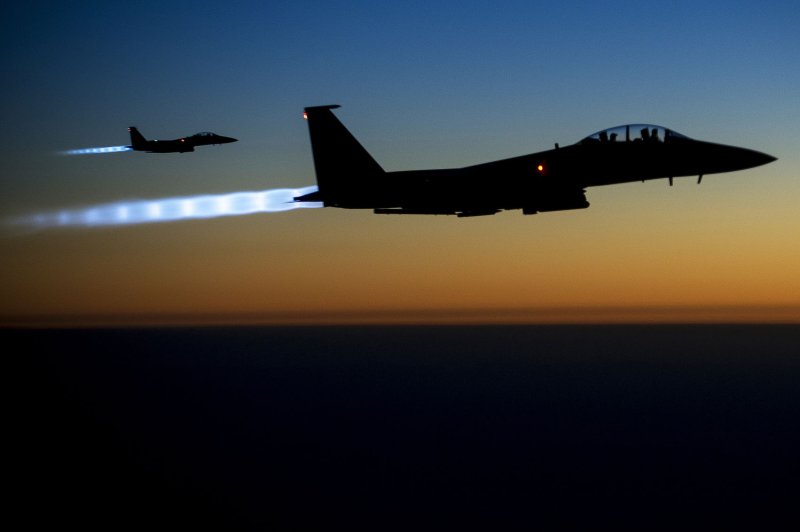A pair of U.S. Air Force F-15E Strike Eagles fly over northern Iraq early in the morning of Sept. 23, 2014, after conducting airstrikes in Syria. The U.S. embassy in Iraq on Sunday, released a statement denying it had halted airstrikes in the Anbar province or that it stopped coordinating with Iraqi forces in the area. The refutation came after some media reports allegedly suggested the contrary. UPI photo by Matthew Bruch/USAF |
License Photo
BAGHDAD, Oct. 4 (UPI) -- U.S. officials on Sunday denied reports they halted coordination with the Iraqi military or stopped conducting airstrikes against forces with the Islamic State in the Anbar province.
"Recent news reports alleging that the U.S.-led coalition has halted air operations or military cooperation with Iraqi Security Forces are simply untrue," the U.S. embassy in Baghdad said in a statement.
"There has been no halt to coalition airstrikes against Daesh or cessation of U.S. advise and assist efforts in Anbar province," the statement continued, using an alternate name for IS.
The statement went on to note that airstrikes Friday and Saturday had struck several targets in Anbar, "including nine airstrikes in direct support of Iraqi military forces' actions near Ramadi."
Since mid-July, the Iraqi military has been involved in an offensive against IS forces in the province, but without making significant gains. The assault has been supported by Iran-trained Shia militias and U.S.-led coalition air power, but U.S. officials assert the two entities do not coordinate their efforts.
A Sunday statement by the U.S. Department of Defense reported the U.S.-led coalition bombed 10 IS positions in Iraq the previous day, including in Anbar province cities such as Fallujah, Baghdadi and the provincial capital, Ramadi.
"The U.S.-led coalition remains committed to working with its Iraqi partners in operations to degrade and destroy Daesh in Anbar province and throughout Iraq," the U.S. embassy said.
The embassy statement refers to media reports that allegedly claimed the United States halted its support for the offensive following last week's announcement by Iraqi officials that Baghdad would share intelligence about IS forces with Iran, Russia and the Syrian regime of President Bashar al-Assad.
The move -- which came three days before Russia began conducting airstrikes in Syria in support of Assad -- is reported to have surprised the Obama administration, whose policy has been to bomb IS on behalf of the Iraqi government since August 2014.
The U.S. embassy's statement comes the same day Iraqi Prime Mininister Haider al-Adadi announced the "Green Zone" -- the 4-square-mile safe zone that was blocked from public access during the U.S. occupation -- was open to ordinary Iraqis for the first time in 12 years.
Meanwhile, suicide car bombings in predominantly Shia neighborhood of Kadhimiya, in northwestern Baghdad, killed 18 people and injured another 37. No groups have claimed responsibility for the attacks, but Iraq's capital has been rocked by dozens of such attacks over recent months, many of which are claimed by IS forces.















